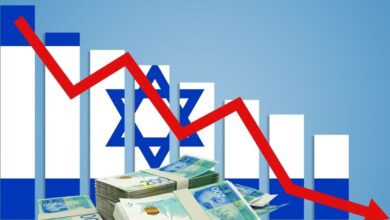How are markets in India reacting to the general elections?
The general elections in India are a prominent event that attracts the attention of financial markets and investors alike, as they represent an important opportunity for the Indian people to choose their representatives in Parliament, and thus determine the country’s future political and economic trends.
This comes in the context of the aspirations of Prime Minister Narendra Modi, who has been in office since 2014, to obtain a third presidential term, after his reign witnessed remarkable economic progress, as India rose to be the fifth largest economy in the world, which raises fundamental questions about the extent to which the Indian economy and markets interact. With these elections.
Economists believe in statements to the “Eqtisad Sky News Arabia” website that elections usually affect the financial markets and the economy, but temporarily and not in the long term, because the market depends on economic trends and inflation, and they pointed out that understanding the relationship between elections and market trends is crucial for For investors, based on India’s growing economic importance.
The general elections in India for the year 2024 began on April 19, and will continue until next June, and will take place in 7 stages during the days of April 19 and 26, May 7, 13, 20, and 25, and June 1, with the results being announced on the fourth of next June, when 968 million voters participate in choosing representatives of Parliament, and thus these elections will decide which party or coalition will form the government, and determine whether Modi will secure a third term in office.
Modi is a market-friendly candidate
Modi is seen as a market-friendly candidate, and under his leadership, India has become the world’s fifth-largest economy with a GDP of $3.7 trillion, and now aims to become the world’s third-largest economy by 2027, according to a recent report by CNN. American BBC.
Research firm Bernstein points out that “Indian markets will face an inevitable correction if Modi’s election victory is disappointing, and markets that are simply looking for a reason to fall may overreact to a feeling that may not mean much in rational terms.”
Indian stock markets had started 2024 at record levels, much of it supported by pre-election optimism – but as the country begins its elections, Bernstein warned of the possibility of a market correction.
The Nifty 50 index, a benchmark index for the Indian stock market, has risen by 3 percent since the beginning of the year after gaining more than 20 percent in 2023, the eighth consecutive year of gains. However, the index fell by about 1.7 percent from its highest level. A recent record close on April 11 amid geopolitical concerns, such as escalating tensions in the Middle East, has roiled global markets.
“Pre-election euphoria is building, as previously set expectations for continuity of power are further reinforced by the prospect of a ruling party coalition winning more than 400 seats,” Bernstein analysts Venugopal Gari and Nikhil Arila said in a note to clients.
“Because of the high expectations for a strong mandate for the BJP and its coalition, even a repeat of 2019’s historic performance may not be enough this time,” the two analysts added.
Elections do not affect long-term market performance
Economist Hussein Al-Qamzi said in his interview with “Eqtisad Sky News Arabia” website: “Election years usually come with the belief that they have a significant impact on the financial markets and the economy. However, historical data indicate that this does not necessarily happen. In the United States, For example, markets tend to rise temporarily regardless of who the party is most likely to win in the elections or what policies it pursues to stimulate the economy. Data also indicate that election results do not affect market performance in the long term, and that market returns usually depend on economic trends. And inflation.”
How can India become “Asia’s largest manufacturer”?
He explained that the matter is not much different in India, as the Indian economy tends to go through a period of fluctuations during election periods, and this is common in electoral periods due to uncertainty about the continuity of policies and the stability of the government, but by reviewing the Sensex index, which is a major index for stocks in… In India, we see increases and decreases at election times, reflecting investor sentiment and reactions to political developments.
Continuity of ruling party policy creates a stable environment for business
Given the elections currently underway in India, the continued majority of the BJP led by Narendra Modi is likely to maintain economic prosperity and prioritize infrastructure, digitalization and allocation policies, and the continuity of the ruling party’s policies is generally considered positive for the market, as it creates a stable environment for business and investment.
However, other electoral results, such as a coalition led by the Republican Party or a weak coalition led by another coalition, may lead to concerns about fiscal discipline and the implementation of reforms, which may affect investor confidence and slow down capital spending by private companies, according to Al-Qamzi.
India seeks to become the “world’s factory” instead of China.. Is this possible?
Economist Al-Qamzi stressed that electoral periods may cause some fluctuations, but they are always short-term and do not affect the fundamentals of the economy or the market.
As for companies and investors, they are required to adhere to a long-term strategy and not be affected by temporary fluctuations during the election and voting period, as he put it.
Economic flexibility
For his part, Ali Hamoudi, CEO and Chief Investment Officer of ATA Global Horizons, believes that understanding the relationship between elections and market trends is crucial for investors, noting that elections in India have a significant impact on the economy. The country and financial markets, based on the growing economic importance of India, which is currently ranked as the fifth largest economy in the world.
Despite the global uncertainty, India’s economic resilience has captured attention, with markets showing remarkable stability and potential for growth. India’s GDP rose by 8.4 percent during the last three months of 2023 compared to the previous year, placing India at the top of the ten largest economies. International, according to Hamoudi.
In the latest semi-annual update on South Asian development, the World Bank raised its forecast for the growth rate of the Indian economy in 2024 to 7.5 percent, which is slightly lower than the 7.6 percent estimated by the National Bureau of Statistics in India. The Bank also raised its forecast for Indian economic growth in 2025 by 20 basis points. Reaching 6.6 percent, referring to “upward revisions to investment growth.”
The US investment bank Goldman Sachs expected the Indian economy to grow by more than 6 percent during the current decade, which will stimulate the pumping of more investments from China in the South Asian country.
The CEO and Chief Investment Officer of ATA Global Horizons explained that despite the fluctuations during election cycles, the financial scene in India achieved significant growth, as the market value of the Bombay Stock Exchange (BSE) rose to more than 4 trillion US dollars, which represents an increase Four-fold since 2014. The BSE Sensex has almost tripled, reaching over 73,000 points from 24,000 points in 2014.
Investment funds’ assets under management (AUM) rose by more than 500 percent, and funds raised in the private placement market rose by more than 120 percent in 2023.
Prosperous economy
There is no doubt that the Indian elections influence market sentiment and investment decisions, while past trends provide valuable insights, as well as India’s evolving economic landscape and strong market performance highlight the country’s resilience and growth potential, according to Hamoudi, who believes that investors should… To remain vigilant and adapt their strategies to navigate through dynamic electoral cycles and capitalize on emerging opportunities in the booming Indian economy. (Sky News)
[previous_post_link]




